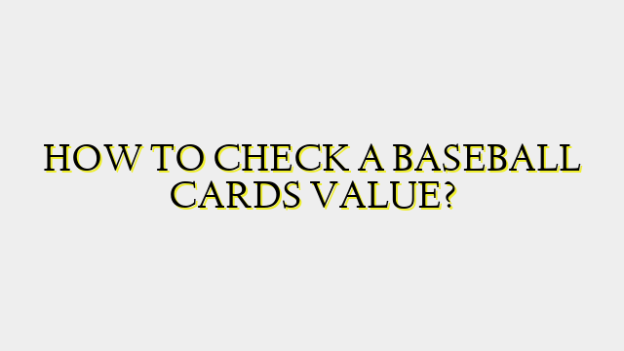The most accurate way to determine the value of a baseball card is to have it professionally appraised by an expert in the business. Professional appraisers who deal in sports memorabilia daily are best equipped to properly examine every aspect of the card, such as its condition and rarity, and provide an analysis of what it could sell for at auction.
Getting a card professionally appraised does require sending the card to the appraisal service, which involves some cost and risk of potential damage or loss during shipping. For an initial valuation without having to send the card away, there are other research methods you can use:
Look up the player name and year on the card online using industry price guide websites like BaseballCardPedia.com or PSAcard.com. These sites maintain databases of sold auction prices for millions of individual baseball cards going back decades. You can enter the exact details of your card and find historical sales averages to see a general range of what similar graded examples in similar condition have sold for previously.
Check major online auction sites like eBay.com. Search for recently completed or ongoing auctions of the same card, or ones featuring the same player from the same set and year. Pay close attention to specifics like the grade if the card has been professionally graded. Recently sold prices on identical or nearly identical cards on those sites provide a good idea of the current market value.
Examine card shop and dealer prices. Browse inventory listings from reputable offline and online baseball card shops or individual dealers. They will often list “buy it now” prices that indicate what they think they can realistically sell the card for given current market conditions. While shop prices tend to be higher than auction prices due to overhead costs and profit margins, they are still a useful data point.
Consult published price guides. In addition to online databases, printed annual price guides from Services like Beckett, Tuff Stuff, and PSA/DNA provide professionally researched valuation ranges for most vintage and modern cards. The guides take into account auction sales and market trends over time to assign a book value to each card based on different grades. While not always definitive of exact prices, the guides are great starting research tools.
Grading services can also potentially impact value considerably. Having rare or valuable vintage cards professionally graded and encapsulated by a reputable third party like PSA or SGC adds authentication, protection from wear, and peace of mind. Certified high grades almost always command significantly higher prices from serious collectors when selling. The grading process involves costs that must be weighed against potential value increase.
Condition is key. Far more than any other factor, the physical condition or state of preservation of the card will determine its worth. Even minor flaws can reduce value dramatically. Professionally graded Population Reports that track census data for graded examples of each card type also provide good indicators of relative rarity for high grades. Mint condition examples are almost always more valuable.
Consider using a sports memorabilia consignment service. For one-of-a-kind valuable cards, or collections worth thousands or more, it may make sense to hire or utilize the services of a professional memorabilia consignment or auction house to handle the sale through their auction or direct sale channels. Industry insiders have established relationships and networks to maximize price compared to a simplistic online listing. Their expertise and reach is advantageous for very valuable items.
Get a second opinion if unsure. It’s always a good idea to check multiple sources and comparison shop when evaluating a card you are considering selling to ensure you have a well-researched handle on current fair market value based on recent competitive sales of similar items. Getting input from knowledgeable collectors or shop owners is wise if any aspect of the valuation seems uncertain.
I hope this detailed overview provides helpful guidance on researching methods to reliably check the value of any baseball card to make an informed assessment of its current estimated worth based on applying all relevant condition, player, set and market factors. Let me know if you need any clarification or have additional questions.




